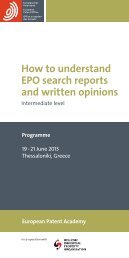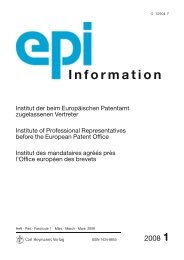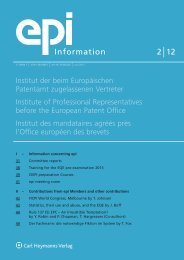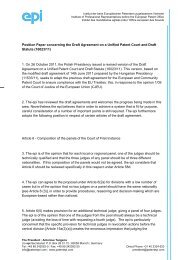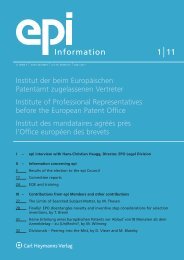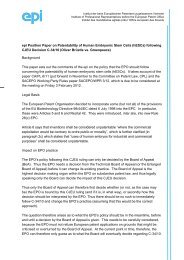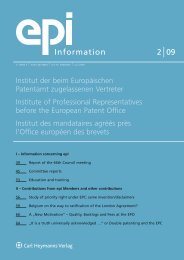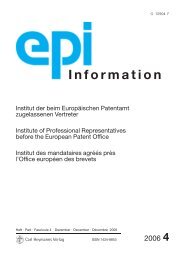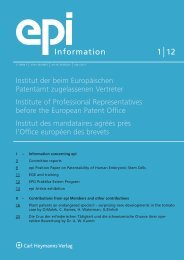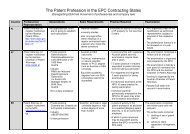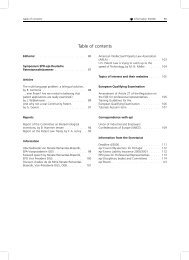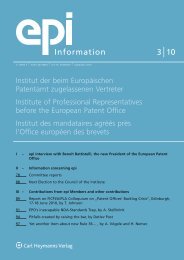epi Information 4/2010
epi Information 4/2010
epi Information 4/2010
- No tags were found...
Create successful ePaper yourself
Turn your PDF publications into a flip-book with our unique Google optimized e-Paper software.
<strong>Information</strong> 4/<strong>2010</strong> Council Meeting 119Pre-Meeting Session69th Council Meeting, Berlin, 19 November <strong>2010</strong>Terry JohnsonEditorial CommitteeThe meeting took place in the afternoon of Friday 19November, <strong>2010</strong> and comprised two sessions, namely:1. The nature, structure and aims of committees of <strong>epi</strong>;and2. Educational activities of the <strong>epi</strong>The first session was opened by Paul Rosenich, Chairmanof the <strong>epi</strong> Disciplinary Committee, who gave a comprehensiveoverview of the committee which has a legalbasis for its existence in Art. 134 a of the ImplementingRegulations. The committee members must beappointed after each Council election, the complementbeing one member from each member state, with thecaveat that the Committee must not include a memberof the <strong>epi</strong> Board. Any amendment to the Regulations canonly be made by a decision of the <strong>epi</strong> Council with a 2/3majority, that decision then having to be ratified by theAC of the EPO.Breaches of the <strong>epi</strong> Code of Conduct are to bebrought to the attention of the Committee, which issplit up into Chambers to which cases are allocated forconsideration. The Committee can impose various sanctions,e.g. it can issue a reprimand, can impose a fine ofnot greater than 10,000 EUR, can issue a warning, andcan refer a case to the Disciplinary Board of Appeal of theEPO. Each Chamber usually comprises 4 members (3 plus1 substitute).The Committee has the power to conduct oral proceedings,which the EPO and <strong>epi</strong> Presidents can attend,or give written advice in advance of the proceedings. TheChairman Paul Rosenich reported that there were notenough French speakers to form the number ofChambers required to hear „French“ cases. He mentioned,too, that there is about one new case per month,and moreover that an increasing number of cases couldbe considered „difficult“, which puts a strain on theCommittee. Most complaints came from clients, notfellow <strong>epi</strong> members. It would be helpful to ensureefficient working if Mr Rosenich was advised of memberswho would be willing to work on his Committee.There was a discussion during which the possibility ofwhether „cross-border“ action could be taken wasraised, i. e. could national groups consider cases, particularlywhere a party, or two or more in an adversarialcase, are in one State. This is not possible as the Committeedeals with EPO attorneys, not national attorneys,and moreover there is no legal basis for referral. On theother hand, there seems to be no reason why partiescould not be asked if they would consider having thematter decided nationally without formal referral to theCommittee. Despite the (increasing) work-load on theChambers, some cases never get to a Chamber as thematter is resolved in correspondence between the Committeeand the party/ies.The By-Laws do not restrict member states to have onerepresentative, they can recommend nil, one, or moremembers.For the future Mr Rosenich suggested that after eachcommittee election, a pool of members willing to be amember of the Committee could be drawn up. Thiswould be a help in forming a Chamber as the need arose.A most interesting and informative presentation forwhich Mr Rosenich was warmly thanked by the meeting.The next topic was a report of the Task Group onpossible reorganisation of the <strong>epi</strong> as set out by thePresident, Kim Finnilä, in his proposals presented tothe 68 th Council meeting in Strasbourg. Dieter Speiserwas the main presenter as leader of the Group, Mr LeVaguerèse and Mr Lyndon-Stanford adding additionalcomments.Mr Speiser made the point in his opening remarks thatthe Council of the Institute governs the working of the<strong>epi</strong>, so Council is the body which determines anychanges in structure of the <strong>epi</strong>.In this regard the Secretariat was, as suggested by thePresident, understaffed and would be strengthened byan additional member, and also additionally by the hiringof a professional who could support the work of thecommittees.Committees are part of <strong>epi</strong> and essentially are its„engines“, so their size, composition and duties are ofimportance, the Group being charged with looking atthese components. The Group had looked at the committeesand concluded that those with fewer members,e.g. up to about 10 , were more effective than those witha larger membership, some of the reasons for this beingthat not enough members of larger committees werefully active in the work of the committee. Also, some ofthe larger committees required under their terms ofreference one member per member state, which couldlead to unwieldiness. As a result of these studies theGroup came up with a set of proposals which can besummarised as (i) members must agree to be activebefore elected; (ii) size of committees to be reducedand those proposed as members must produce to Councila CV and a note setting out their motivation to be onthe committee to which they are to be elected; (iii)substitute members must agree to proposal; (iv) eachconstituency of the <strong>epi</strong> can nominate an associatemember; (v) committees can elect further associates; (vi)the chair of a committee can elect up to three associatesas full members; and (vii) committee chairs can inviteII – <strong>Information</strong> concerning <strong>epi</strong>



